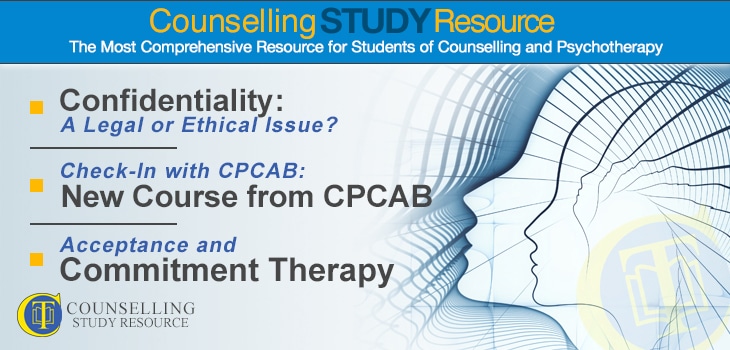156 - Acceptance and Commitment Therapy
Confidentiality: A Legal or Ethical Issue? - New Course from CPCAB
In episode 156 of the Counselling Tutor Podcast - the last academic podcast for this academic year - Ken Kelly and Rory Lees-Oakes discuss the legal and ethical aspects of confidentiality. 'Check-In with CPCAB' then looks at a new course to be offered by CPCAB. Last, in 'Practice Matters', the presenters talk about acceptance and commitment therapy (ACT), which is the topic of a new Counsellor CPD lecture.
Confidentiality: A Legal or Ethical Issue? (starts at 1.55 mins)
Confidentiality is not secrecy; in the counselling context, it is a contracted agreement between therapist and client about what you may have to share of the client's material. But is confidentiality a legal or an ethical issue?
The answer is both: but while the situations where we are legally obliged to break confidentiality are set in stone (and overseen by the legal system), those in which we might ethically be bound to do so are far more situation-dependent (and overseen by our ethical body, e.g. the British Association for Counselling and Psychotherapy).
Examples of situations in which we are required by law to break confidentiality are drug trafficking, money laundering and terrorism.
Rory has written a handout about the differences between ethical and legal requirements for counsellors. You can access this here.
Check-In with CPCAB: CPCAB Developments (starts at 14.15 mins)
Rory talks to Ray van der Poel (Head of Business and Development) at CPCAB (Counselling & Psychotherapy Central Awarding Body) about a new version of its Level 4 Diploma in Therapeutic Counselling, which is accredited by the BACP.
The difference this will make to students who complete this version is that they will not have to take the BACP's Certificate of Proficiency test in order to become registered members after qualification.
The new qualification will be available from autumn 2020, and will be launched initially as an opt-in pilot scheme for existing centres who already have strong links with BACP, for example through their tutors being BACP members and their courses drawing on the BACP's Ethical Framework for the Counselling Professions.
Graduates of the programme will not have to become BACP-registered members; they will still be free to join other professional bodies in the usual way.
This segment has been sponsored by CPCAB, the UK's only awarding body run by counsellors for counsellors. You can find out more about CPCAB and the topic discussed today on its website.
While we hope to continue to link up with CPCAB for other features in future, this was the last in the current series of 'Check-In with CPCAB'.
Look out for our new slot next academic year, 'The Digital Revolution'. There, we will be exploring lots of different aspects of technology-assisted therapy, a hot topic in the world of counselling and psychotherapy.
Acceptance and Commitment Therapy (starts at 33.50 mins)
In this part of the Counselling Tutor Podcast - aimed at supporting qualified practitioners to sharpen their competence - Rory and Ken talk about Acceptance and Commitment Therapy or ACT.
ACT is a 'new kid on the block' among the counselling modalities, and the topic of a new CPD lecture by psychologist and CBT therapist Dr Richard Bennett. It was originally developed in the USA by Dr Steven Hayes.
Acceptance and Commitment Therapy is one of the third-wave CBT approaches, seeking to remedy perceived deficiencies in the CBT approach by drawing on Eastern ideas - ACT in particular uses mindfulness to support clients to let go of unhelpful thoughts and become more able to live fully in the present moment.
Acceptance and Commitment Therapy works with clients to help them:
- Accept their reactions and be present
- Choose a valued direction
- Take action.


